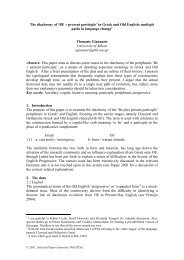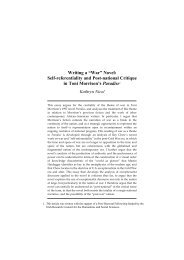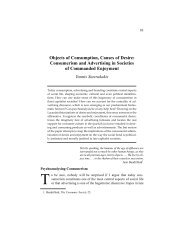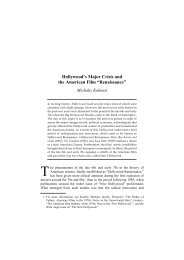19 International Symposium on Theoretical and Applied Linguistics ...
19 International Symposium on Theoretical and Applied Linguistics ...
19 International Symposium on Theoretical and Applied Linguistics ...
Create successful ePaper yourself
Turn your PDF publications into a flip-book with our unique Google optimized e-Paper software.
G E N E R A L S E S S I O N<br />
Learning to perceive <strong>and</strong> produce the British English vowels<br />
via computer-based auditory training<br />
Angelos Lengeris<br />
University College L<strong>on</strong>d<strong>on</strong><br />
a.leggeris@ucl.ac.uk<br />
The percepti<strong>on</strong> <strong>and</strong> producti<strong>on</strong> of vowels in a sec<strong>on</strong>d language (L2) is generally a difficult task. When<br />
both members of an L2 c<strong>on</strong>trast are assimilated to a single first language (L1) category, learning is<br />
more challenging than cases where each member is assimilated to a different L1 category (Best,<br />
<str<strong>on</strong>g>19</str<strong>on</strong>g>95; Flege, <str<strong>on</strong>g>19</str<strong>on</strong>g>95). At the same time, it has been shown that L2 percepti<strong>on</strong> <strong>and</strong> producti<strong>on</strong> can<br />
improve via computer-based auditory training (with most studies focusing <strong>on</strong> c<strong>on</strong>s<strong>on</strong>ant learning, see<br />
for example Logan et al., <str<strong>on</strong>g>19</str<strong>on</strong>g>91; Bradlow et al. <str<strong>on</strong>g>19</str<strong>on</strong>g>97). With the excepti<strong>on</strong> of Ivers<strong>on</strong> & Evans (2007)<br />
who trained German <strong>and</strong> Spanish native speakers’ percepti<strong>on</strong> of English vowels but did not examine<br />
gains in producti<strong>on</strong>, research <strong>on</strong> vowel training has exclusively examined Japanese native speakers<br />
(e.g. Lambacher et al., 2005; Nishi & Kewley-Port, 2007).<br />
The present study investigated the effectiveness of auditory training <strong>on</strong> Greek speakers’ percepti<strong>on</strong><br />
<strong>and</strong> producti<strong>on</strong> of Southern British English vowels with the goal of exp<strong>and</strong>ing our knowledge <strong>on</strong> vowel<br />
training. Greek has a simple 5-vowel system with no “l<strong>on</strong>g-short” or “tense-lax” distincti<strong>on</strong>s <strong>and</strong> Greek<br />
learners of English have difficulties with most English vowels especially when durati<strong>on</strong>al informati<strong>on</strong> is<br />
reduced (Lengeris & Hazan, 2007). Training c<strong>on</strong>sisted of a pre-test phase, a training phase, <strong>and</strong> a<br />
post-test phase. The pre- <strong>and</strong> post-phase assessed Greek participants’ percepti<strong>on</strong> <strong>and</strong> producti<strong>on</strong> of<br />
English vowels (embedded in bVt words). During the training phase, participants received 5 sessi<strong>on</strong>s<br />
of High Variability Ph<strong>on</strong>etic Training (HVPT: Logan et al., <str<strong>on</strong>g>19</str<strong>on</strong>g>91), c<strong>on</strong>sisting of an identificati<strong>on</strong> task<br />
with feedback using natural words spoken by multiple talkers covering the entire English vowel space.<br />
The results showed that 5 sessi<strong>on</strong>s of training significantly improved the trainees’ overall<br />
identificati<strong>on</strong> of English vowels (eighteen percentage points) <strong>and</strong> that improvement generalized to a<br />
new English speaker. Furthermore, auditory training had a positive effect <strong>on</strong> the trainees’ producti<strong>on</strong> of<br />
English vowels. The relati<strong>on</strong>ship between gains in percepti<strong>on</strong> <strong>and</strong> producti<strong>on</strong> for individuals is<br />
discussed.<br />
References<br />
Best, C. T. <str<strong>on</strong>g>19</str<strong>on</strong>g>95. A direct realist view of cross-language speech percepti<strong>on</strong>. In W. Strange (eds), Speech<br />
percepti<strong>on</strong> <strong>and</strong> linguistic experience: Issues in cross-language research. Tim<strong>on</strong>ium, MD: York Press, 171–<br />
204.<br />
Bradlow, A. R., Pis<strong>on</strong>i, D. B., Akahane-Yamada, R. & Tohkura, Y. <str<strong>on</strong>g>19</str<strong>on</strong>g>97. Training Japanese listeners to identify<br />
English /r/ <strong>and</strong> /l/: IV. Some effects of perceptual learning <strong>on</strong> speech producti<strong>on</strong>. Journal of the Acoustical<br />
Society of America, 101, 2299-2310.<br />
Flege, J. E. <str<strong>on</strong>g>19</str<strong>on</strong>g>95. Sec<strong>on</strong>d language speech learning theory, findings, <strong>and</strong> problems. In W. Strange (eds), Speech<br />
percepti<strong>on</strong> <strong>and</strong> linguistic experience: Issues in cross-language research. Tim<strong>on</strong>ium, MD: York Press, 233–<br />
277.<br />
Ivers<strong>on</strong>, P. & Evans, B. G. 2007. Auditory training of English vowels for first-language speakers of Spanish <strong>and</strong><br />
German. Proceedings of the 16th <str<strong>on</strong>g>Internati<strong>on</strong>al</str<strong>on</strong>g> C<strong>on</strong>gress of Ph<strong>on</strong>etic Sciences. Saarbrücken, Germany, 1625-<br />
1628.<br />
Lambacher, S. G., Martens, W. L., Kakehi, K., Marasinghe, C. A. & Molholt, G. 2005. The effects of identificati<strong>on</strong><br />
training <strong>on</strong> the identificati<strong>on</strong> <strong>and</strong> producti<strong>on</strong> of American English vowels by native speakers of Japanese.<br />
<strong>Applied</strong> Psycholinguistics, 26, 227-247.<br />
Lengeris, A. & Hazan, V. 2007. Perceptual assimilati<strong>on</strong> <strong>and</strong> discriminati<strong>on</strong> of Southern British English vowels by<br />
native speakers of Greek <strong>and</strong> Japanese. Proceedings of the 16th <str<strong>on</strong>g>Internati<strong>on</strong>al</str<strong>on</strong>g> C<strong>on</strong>gress of Ph<strong>on</strong>etic<br />
Sciences. Saarbrücken, Germany, 1641-1644.<br />
Logan, J. S., Lively, S. E. & Pis<strong>on</strong>i, D. B. <str<strong>on</strong>g>19</str<strong>on</strong>g>91. Training Japanese listeners to identify English /r/ <strong>and</strong> /l/: A first<br />
report. Journal of the Acoustical Society of America, 89, 874-886.<br />
Nishi, K. & Kewley-Port, D. 2007. Training Japanese listeners to perceive American English vowels: Influence of<br />
training sets. Journal of Speech, Language, <strong>and</strong> Hearing Research, 50, 1496-1509.<br />
<str<strong>on</strong>g>19</str<strong>on</strong>g> th ISTAL 31






